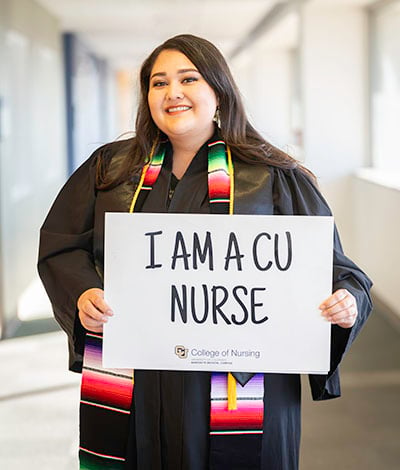-
Find a Group of Friends & Make Time to Study

CU Nursing students study group
|
“You can’t do nursing school alone. Having a supportive group that is also going through the same struggle you are is important for people to understand.” – Bailey Paskach, BS in Nursing student (Traditional pathway)
“You hit the ground running so it’s important to find a good study group and meet on a weekly basis. Having a good study group to review things constantly and talk about clinical experiences and relating it back to class is helpful.” – Hannah & Kaitlyn Schmidt, BS in Nursing students (UCAN program)
“Studying takes so much of your time, and in the UCAN program you’re studying for three to four tests per week. I had to schedule time for myself to study.” – Arleny Muñoz, BS in Nursing graduate
-
Turn to Faculty Members & Clinical Preceptors for Guidance
“When I go to clinicals I ask the nurses around me what they do to decompress and what they do to cope after experiencing something difficult. Those things aren’t directly taught but they’re really important to preserve the longevity of your career and preserve your mental health.” – Mykell Fisher, BS in Nursing graduate
“Faculty members were always available via email or phone call when I had issues with scheduling or questions about assignments.” – James Damioli, BS in Nursing graduate
“Faculty are always willing to talk one-on-one. And they have a lot of teaching methods with videos, discussions, interactive group projects, and individual projects. It’s important to them that we understand the course materials.” – Joe Martinez, BSN, MSN, and BS-DNP student
-
When You’re Stressed, Take a Break
“Whether it’s listening to music or going for a walk in the park, take some time for yourself.” – Bailey Paskach
“It’s really important to check in with yourself and give yourself a lot of grace. And remember, you need to eat, drink water, and sleep.” – Mykell Fisher
-
Find a Mentor
“I’ve had great mentors, like Senior Instructor of Clinical Teaching Theresa Nino, RN, MSN, CCRN. I think her presence and her knowledge has been an inspiration to me and a reminder that I could do anything.” – Arleny Muñoz
-
Ask for Help!

CU Nursing's Peer Tutoring Program an be in person or online via Zoom for tutoring sessions.
|
“Everyone wants you to succeed, things aren’t cutthroat. If you don’t understand something, it’s not shameful to say ‘I don’t get it’. Everyone is willing to help and classmates will say ‘Let me send you these resources that helped me’.” – Hannah & Katilyn Schmidt
“Sign up for CU Nursing’s Peer Tutoring Program. Think of it as a guaranteed one-hour study session where tutors are obligated to keep you on task. Even if it’s just an hour, it’s better than not studying.” – Michael Fray, BS in Nursing student (Traditional pathway)
-
Put Yourself Out There
“Attend listening sessions and reach out to your program’s facilitators. If you have a moment to sit and listen, whether it’s to guest speakers or attending presentations, it’s a great place to start. You’ll meet a lot of other students, and hearing their experiences will help you decide if a certain nursing program is right for you.” – Marcy Polk, MSN, RN, NEA-BC, & DNP-VMHC graduate
“Take risks, put yourself out there, and have confidence in yourself. You may not feel like an expert yet, but most of your patients are going to look at you as an expert and the advice you offer them, the perspectives you bring to the appointments with them are those of a growing expert.” – Stuart Eynon, MS - PMHNP graduate
-
If You Don’t Know Everything…That’s Okay
“I think sometimes especially as someone who already had another degree – there was this idea that I’m supposed to be very knowledgeable already, but it’s okay not to know things. It’s okay to change your mind as well, and it’s okay to not know where you want to end up, it’s okay to find out you have passions in other areas, and giving yourself grace that you won’t know everything, and you might change your mind.” – Mykell Fisher
-
Become Immersed in Your Classes
“You get out of it what you put into it. You can just do the assignments and graduate, but the reality is that you’re not going to be able to take that into practice and become a true nursing leader if you’re not really immersed in this stuff.” – Erica Messinger, RN to BS graduate
“When you sit there and go ‘I don’t think I can do this anymore’ …well you’re doing it! You’re in the moment, you’re submitting to discussion boards, you’re posting the assignment and you’re in it, you’re doing it.” – Mia Roberts, PhD, CPNP-PC
-
You Can Do This!

Lenae Aragon, BS in Nursing shows off her 'I Am a CU Nurse' sign
|
“You have support from the staff and peers. You’re going to feel supported here at CU. Don’t doubt yourself. I feel like people (going into the UCAN program) should hear this – as someone who’s been there, you’re going to be okay.” – Lenae Aragon, BS in Nursing graduate
“It will be a bit of a sacrifice. You may have late nights studying or you might be stressed with your other obligations with work and your family. You’ll have to give a lot, but it’s worth it in the end.” – Joe Martinez
-
Remember Your “Why”
“It’s really important that when things get hard – and they will – is to remember your ‘why’ and why you chose nursing in the first place. It’s easy to get bogged down knowing that we have so many things coming at us, so remembering your why can be very grounding and providing you with the motivation you need.” – Mykell Fisher






